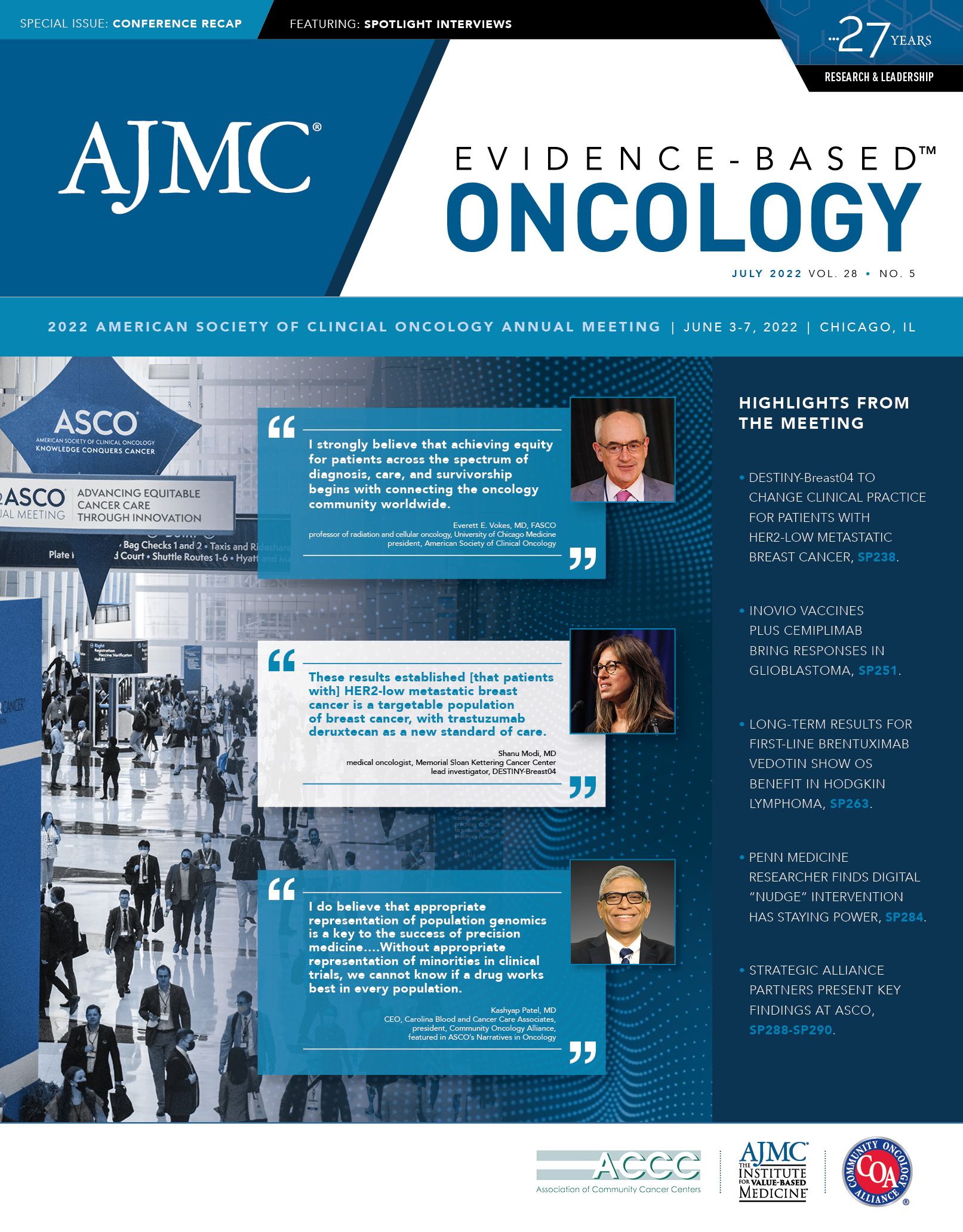- Center on Health Equity & Access
- Clinical
- Health Care Cost
- Health Care Delivery
- Insurance
- Policy
- Technology
- Value-Based Care
Sacituzumab Govitecan Improved PFS for Patients With a Common Type of Breast Cancer and Limited Options—But Is It Enough?
TROPiCS-02, a phase 3 study, was presented during a session on breast cancer at the 2022 Annual Meeting of the American Society of Clinical Oncology.
For patients with advanced hormone receptor (HR)-positive or human epidermal growth factor receptor 2 (HER2)-negative breast cancer who have gone through available treatment options, anything that offers hope might be worth a try. But how many weeks of keeping the cancer at bay are worth the risk of more adverse effects or higher costs? Are 6 weeks enough?
Those were the unanswered questions after the presentation of data from TROPiCS-02 (NCT03901339), a phase 3 study whose results were presented on June 4 during a session on breast cancer at the 2022 annual meeting of the American Society of Clinical Oncology (ASCO).
TROPiCS-02 was designed to evaluate sacituzumab govitecan (sacituzumab), an antibody-drug conjugate (ADC), against physician’s choice of chemotherapy in patients who have received multiple prior therapies—including a CDK4/6 inhibitor and endocrine therapy. Sacituzumab, sold by Gilead as Trodelvy, is already approved in advanced triple-negative breast cancer; no ADC is approved in HR-positive or HER2-negative breast cancer, the most common subtype, which comprises about 70% of all breast cancer cases.
The trial results were presented by Hope S. Rugo, MD, FASCO, a professor of medicine and director of Breast Oncology and Clinical Trials Education at the University of California, San Francisco Helen Diller Family Comprehensive Cancer Center. Rugo outlined the parameters of the study, which involved 543 patients at 113 international sites; more than half the patients had received 3 or more regimens.
According to the study design, overall survival (OS) would be tested if progression-free survival (PFS) was statistically significant, followed by overall response rate and quality of life. The data Rugo presented is the first primary PFS analysis and the first of 3 planned OS interim analyses. Data included the following:
- Sacituzumab showed improved median PFS over chemotherapy by 34%, but the actual time difference was 5.5 months vs 4.0 months (stratified HR, 0.66; 95% CI, 0.53-0.83; P = .003).
- PFS rates favored sacituzumab over chemotherapy at 6, 9, and 12 months; comparisons were 46% vs 30%, 33% vs 17%, and 21% vs 7%, respectively.
- There was a nonsignificant trend in OS in favor of sacituzumab at 13.9 vs 12.3 months (stratified HR, 0.84; 95% CI, 0.67-1.06; P = .14). Rugo said the data are not yet mature and more time is needed to evaluate OS.
Sacituzumab had a better median duration of response (DOR), which means the tumor responded to treatment for a longer period without spreading. The median DOR for sacituzumab was 7.4 months compared with 5.6 months for chemotherapy. - Benefits were generally consistent across subgroups.
- The safety profile was consistent with previous studies of sacituzumab; 6% of patients discontinued sacituzumab due to treatment-emergent adverse events vs 4% for chemotherapy. Adverse events were reported in 74% of patients receiving sacituzumab vs 60% receiving chemotherapy, the most common being neutropenia (51% vs 39%) and diarrhea (10% vs 1%).
During the session, Rugo was asked whether 1.5 months represented a clinically meaningful benefit, and she said she had expected that question. “I think we suffer a little bit from our statistics in patients who are heavily pretreated for metastatic disease,” she noted. In this population, she explained, a large number of patients often progress early on, so it is not unusual to see a “fairly modest absolute difference” in PFS alongside a “very robust hazard ratio.”
Given the lack of choices for these patients, who are both heavily pretreated and endocrine resistant, Rugo said sacituzumab “should be considered a potential treatment option in this patient population.”
ASCO breast cancer expert Jane Lowe Meisel, MD, agreed. “[The findings from] this trial show that sacituzumab govitecan, which is already approved for the treatment of metastatic triple-negative breast cancer, may represent an important new option for patients with endocrine-resistant HR-positive/HER2-negative metastatic breast cancer,” she said in a statement.
“This would address a critical unmet medical need, given the limited number of effective treatment options currently available for these patients.”
But Véronique C. Dieras, MD, of Eugène Marquis Center in Rennes, France, who discussed the first group of abstracts on metastatic breast cancer, said more data are clearly needed. “When we look to the result of a phase 3 study, we have to ask about the magnitude of benefit and if it’s clinically meaningful. We see in these studies that we have only 1.5 months of difference….The data are not mature.”
Reference
Rugo HS, Bardia A, Marmé F, et al. Primary results from TROPiCS-02: a randomized phase 3 study of sacituzumab govitecan (SG) versus treatment of physician’s choice (TPC) in patients (Pts) with hormone receptor–positive/HER2-negative (HR+/HER2-) advanced breast cancer. J Clin Oncol. 2022;40(suppl 17):LBA1001. doi:10.1200/JCO.2022.40.17_suppl.LBA1001

The Importance of Examining and Preventing Atrial Fibrillation
August 29th 2023At this year’s American Society for Preventive Cardiology Congress on CVD Prevention, Emelia J. Benjamin, MD, ScM, delivered the Honorary Fellow Award Lecture, “The Imperative to Focus on the Prevention of Atrial Fibrillation,” as the recipient of this year’s Honorary Fellow of the American Society for Preventive Cardiology award.
Listen
Promoting Equity in Public Health: Policy, Investment, and Community Engagement Solutions
June 28th 2022On this episode of Managed Care Cast, we speak with Georges C. Benjamin, MD, executive director of the American Public Health Association, on the core takeaways of his keynote session at AHIP 2022 on public health policy and other solutions to promote equitable health and well-being.
Listen
